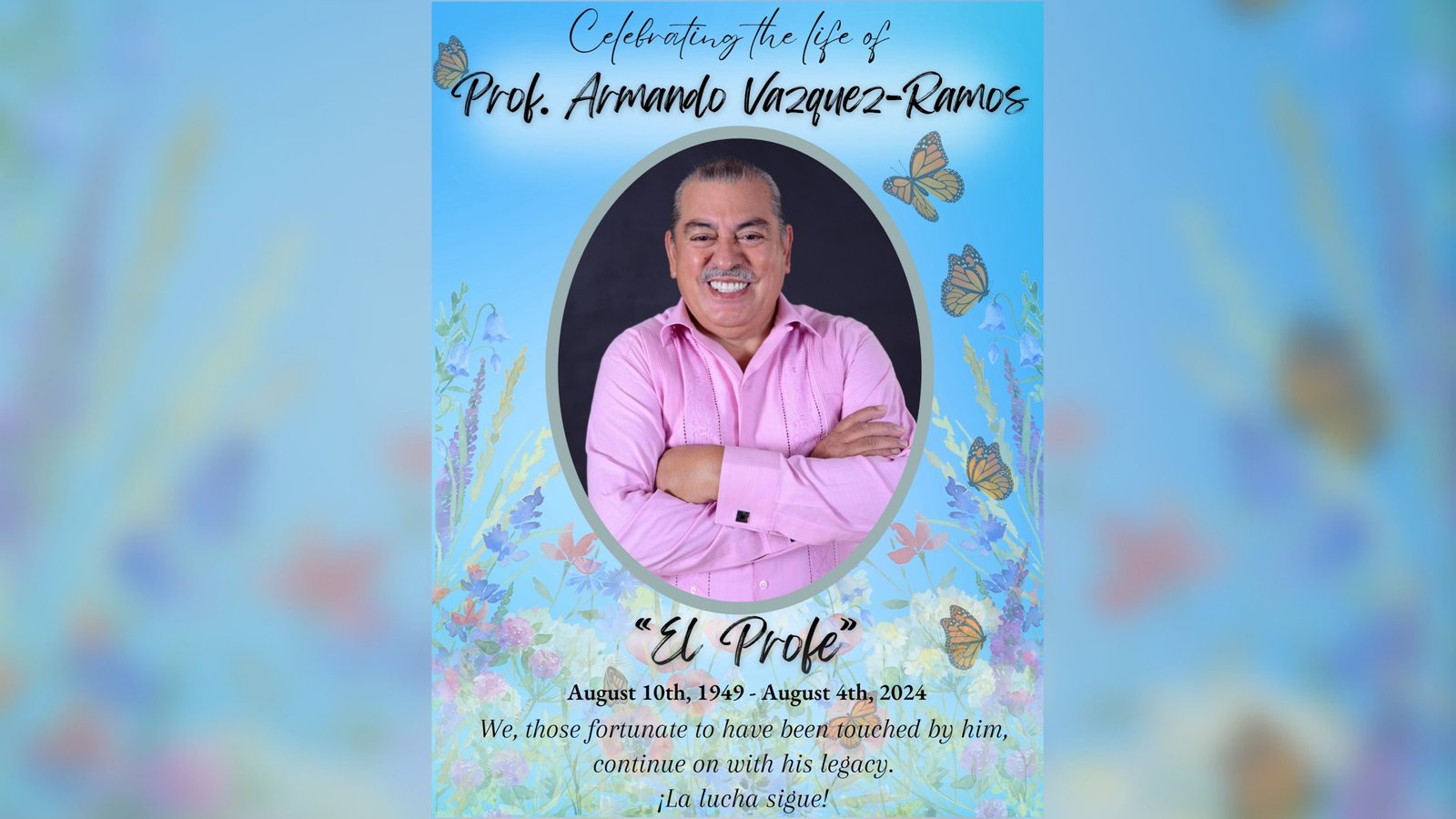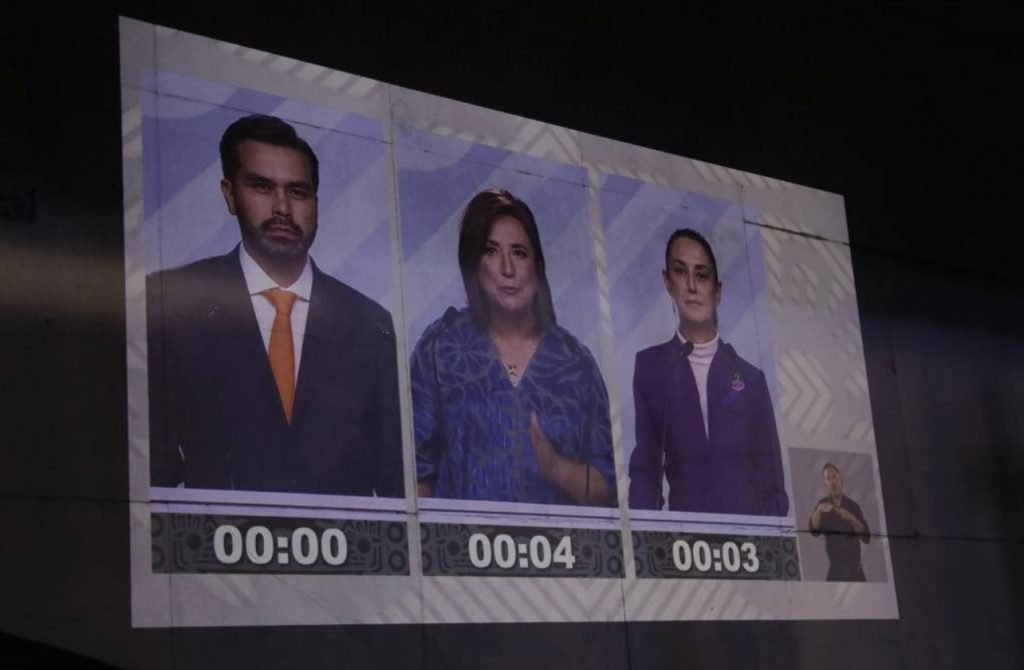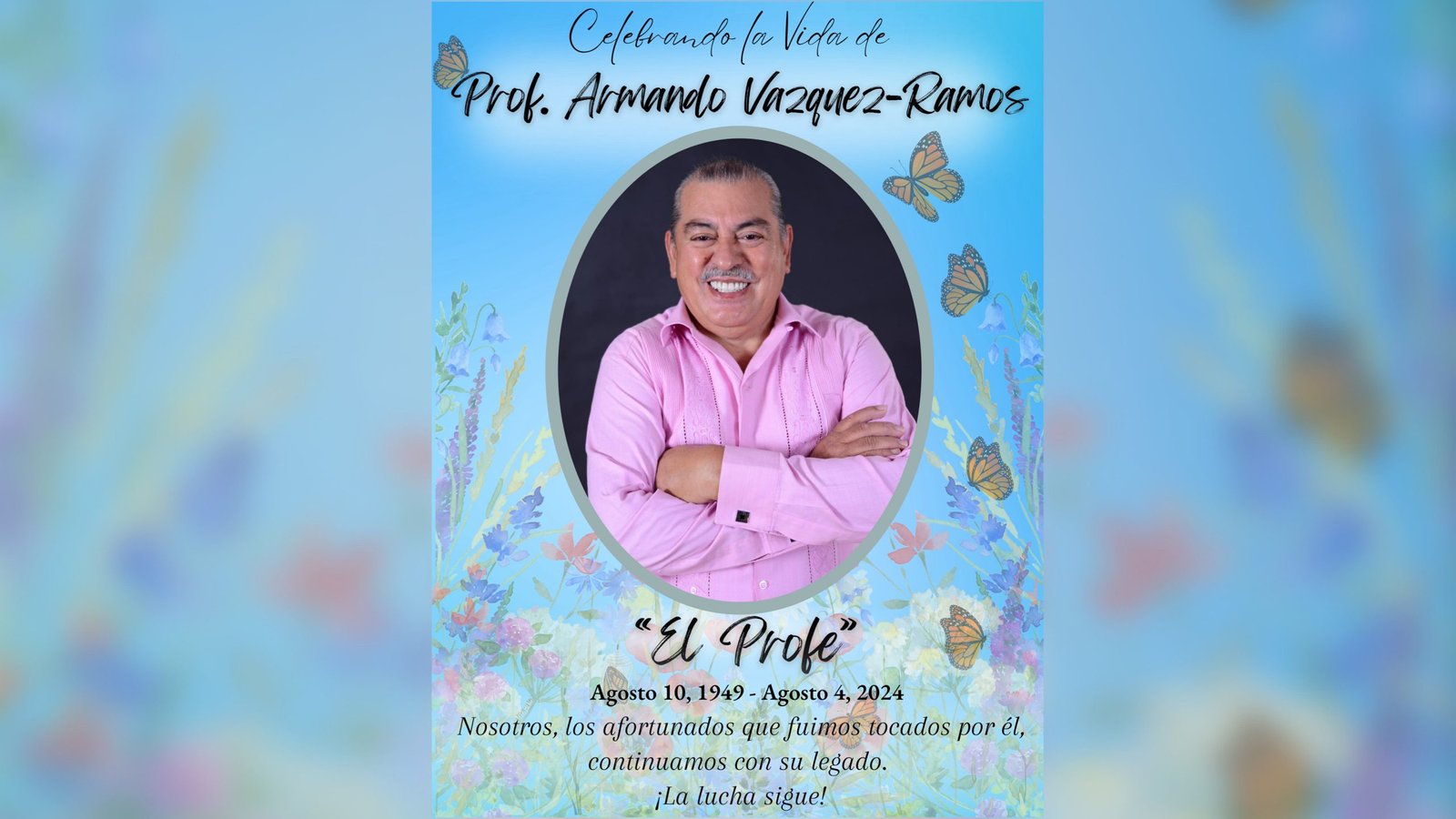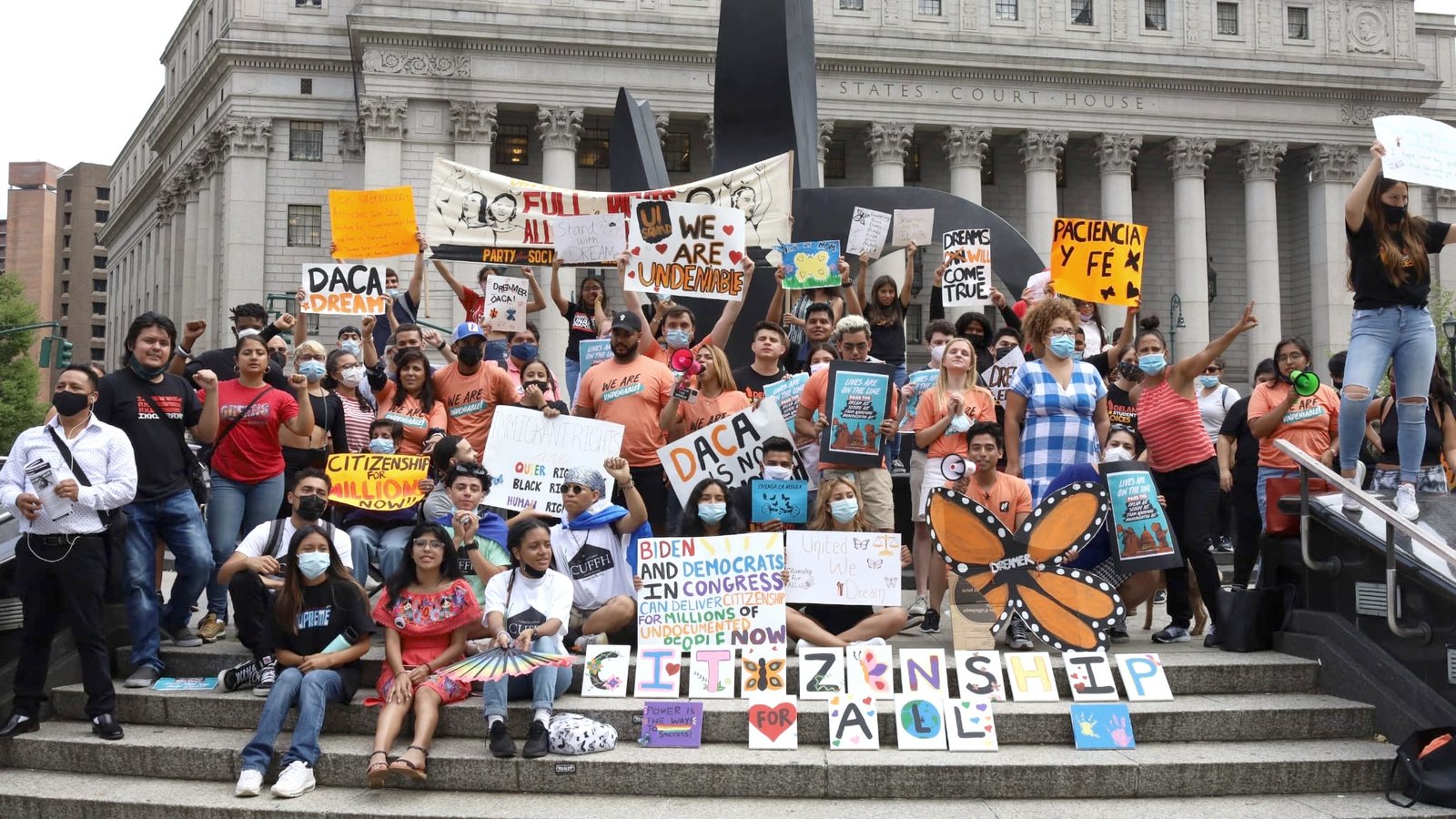|
By Gustavo Arellano | Los Angeles Times | May 21, 2024 | Photo Courtesy of Myung J.Chun
|
|
Fifty-five years ago at Cal State L.A., these activists had their own tents, and demands
An all-star lineup of Cal State L.A. Chicano alumni showed up Saturday morning to check out the school’s growing pro-Palestinian encampment. But curiosity wasn’t the main reason they came to the tents.
The six, all in their late 70s or early 80s, also came to remember.
Fifty-five years ago this June, they were part of a weeklong campout — officially called “el encampamento” (the encampment) — at that exact location, next to the gym.
Today, the protesters are demanding that Cal State L.A. drop all investments with Israel, boycott organizations with ties to the country and call for a permanent cease-fire in the Gaza Strip.
Back then, activists wanted a Chicano Studies program, a community center and more Chicano students at the then-overwhelmingly white campus. They also asked administrators to fight a plan by then- Gov. Ronald Reagan to gut the school’s Educational Opportunity Program, which helped first-generation college students.
“I was really happy when I heard about this encampamento,” said Phillip Castruita, a co-founder of Cal State L.A.’s first Latino activist group, United Mexican American Students. “The spirit of students is still around, and it’s important that they know about what’s happening in the world.”
He sat on a bench a stone’s throw from the current encampment, which was in its third week, joining similar pro-Palestinian protests at universities around the country. Young men and women in graduation gowns and sashes walked past us on the way to pose for photos elsewhere. Read More
|
|
|
By La Educacion Staff | La Education | May 12, 2024 | Photo Courtesy of La Educacion | Translated by the CMSC
|
|
Karina Ruiz is already on the threshold of history. She will be the first Mexican migrant to be a senator of the Republic.
She is a “dreamer”, originally from Tlanepantla, State of Mexico, with Oaxacan roots, who is 39 years old, of which 24 she has lived in Phoenix, Arizona, she has three children and three grandchildren, she has a degree in biochemistry and a social fighter.
Postulated by Morena, she emphasizes:
“In the Senate there is no one who understands the experiences of migrants. “It is necessary to legislate with the vision of migrants.”
She was presented, along with the half dozen migrants who will reach the Mexican Legislative Branch as multi-member candidates. Five will go to the Chamber of Deputies and she will have a seat in the Upper House. They were welcomed by the president of Morena, Mario Delgado, and former Chancellor Marcelo Ebrard, coordinator of the future legislators.
Petite, with verbal fluency, in dialogue with La Educación, Ruiz, who is knowledgeable about the American way of life, reveals that she will go to Washington to dialogue with United States legislators to speak “as equals” to see how to solve problems of the “dreamers” and the more than eleven million Mexicans living in that nation in order to seek a path to legalize their immigration status.Read More
|
|

|
|
Karina’s Speech at Alcadia Venustiano Carranza, Ciudad de Mexico – Agosto 9, 2023
|
|

|
|
Karina Ruiz – Dreamer Candidate for the Mexican Senate
|
|

|
|
Who is Karina Ruiz?
|
|
|
By The Cornell Daily Sun Staff | The Cornell Daily Sun | May 21, 2024 | Photo Courtesy of Cameron Pollack
|
|
Amid pressing calls for immigration justice from President Joe Biden, philanthropies and beyond, a pioneering solution is taking place in Ithaca.
Prof. Jaclyn Kelley-Widmer, law, and Prof. Stephen Yale-Loehr, law, have secured a $1.5 million grant from Bay Area humanitarian foundation Crankstart to fund Path2Papers, an innovative non-profit designed to provide legal assistance to Deferred Action for Childhood Arrivals recipients and DACA-eligible individuals.
Based at Cornell Law School, Path2Papers offers legal consultations and guidance to DACA-eligible San Francisco Bay area residents and Cornell students.
Path2Papers’ ties to Cornell extend even further. The program’s legal team is composed of five lawyers, three of whom are Cornell alumni. It will also be the focus of Cornell Law’s 1L Immigration Law and Advocacy Clinic. The clinic provides select Cornell Law students with the opportunity to contribute to immigration cases and provide education on immigration law.
“We are incredibly grateful and excited for this opportunity [to have Path2Papers partner with the clinic], and we are excited for law students to be involved,” Kelley-Widmer said. “It is so meaningful for law students to represent these clients and work on behalf of this community.”
Notably, Path2Papers is one of the few programs in the country to facilitate access to employment-based visas and other avenues toward lawful permanent residency. Read More
|
|
|
By Nicole Acevedo | NBC News | May 8, 2024 | Photo Courtesy of Mandel Ngan
|
|
Young immigrants who have been shut out of DACA point to the program’s success in an attempt to build bipartisan support for “a path to U.S. citizenship.”
As immigration policies take center stage in the nation’s political debate and the fate of the Deferred Action for Childhood Arrivals program remains uncertain, senators are holding a hearing Wednesday on the “urgent need to protect immigrant youth,” according to the Senate Judiciary Committee.
The occasion has prompted 1,636 scholars and alumni of TheDream.US, an organization helping DACA recipients and other undocumented immigrant youths known as Dreamers go to college, to sign a letter urging Congress to “provide us with the opportunity to pursue a path to U.S. citizenship naturalization.”
“Such action will provide certainty to our families and communities and strengthen our nation’s economy by ensuring the future of a vital, vibrant workforce,” the letter, first shared with NBC News, reads.
Other organizations such as evangelical and educational groups have also shared letters of support ahead of the hearing.
Gaby Pacheco, an education leader and president of TheDream.US, is one of five witnesses who spoke at the hearing. She advocated for legislation that would give a pathway to legalization to young immigrant adults who’ve spent most of their lives in the U.S., something that polls have shown has broad support. Read More
|
|
|
WATCH THE CMSC DOCUMENTARY
|
|
|

|
|
No Mas Sobras, No More Crumbs
|
|
|
Missed the deadline for Summer 2024?
Don’t Worry –
Apply Now for Fall 2024 and Winter 2025!
|
|
|
|
Travel – Study in Mexico during our
Fall and Winter Programs from
1 week or up to 3 months!
|
|
|
|
PROGRAM DESCRIPTION:
Given the tenuous future of DACA, the CMSC has decided to create the Fall 2024 and Winter 2025 Independent Dreamers Study Abroad Programs (IDSAP) in order to offer a broader and a more flexible travel-study opportunity for Dreamers in Mexico and other countries of origin from October 15, 2024 to January 15, 2025 for the Fall Program and December 1, 2024 to February 28, 2025 for the Winter Program.
This unique model will allow for both, Mexican-origin Dreamers and DACA-mented Dreamers from other countries to discover their birthplace, cultural roots, reaffirm their identity, reconnect with their families, and explore higher education opportunities in Mexico.
This program will operate under the CMSC’s Mexico City-based collaboration with a network of partner institutions, which include: Mexico’s National Autonomous University (UNAM), Facultad de Estudios Superiores de Acatlán Campus and Centro Cultural Universitario Tlatelolco, the five-campus prestigious Mexico City Metropolitan Autonomous University (UAM), the public Mexico City Autonomous University (UACM), El Colegio de la Frontera Norte (COLEF), Centro Cultural Tijuana (CECUT) and the CILAC Freire Institute in Cuernavaca, Morelos.
The CMSC’s Fall 2024 and Winter 2025 Independent Dreamers Study Abroad Programs (IDSAP) have been designed specifically to offer travel-study options for individual Dreamers or in small groups, for colleges and universities to develop long-term and short-term projects for their Dreamers and to continue to require an ethnographic research paper based on their experience returning to their homeland and discovering Mexico.
The Fall 2024 and Winter 2025 Independent Dreamers Study Abroad Programs (IDSAP) are explicitly designed for colleges and universities, Labor Unions, Community-based Organizations, Churches and Religious Organizations, and Dreamers’ organizations, interested in contracting with the CMSC for travel-study abroad programs designed specifically for the sponsoring institution’s purpose and participants, including non-Latino and non-Spanish-speaking Dreamers… CLICK HERE TO READ MORE
|
|
|
Do not wait until the last minute!!!
|
|
|
Please take into consideration that the Advance Parole application approval process time can vary from 3 to 6 months; thus, we will give preference to those applicants who are quick to submit their completed online application and letter of recommendation.
|
|
|
Please subscribe to our Newsletter for updates regarding future programs.
|
|
|
|
By Aldrin Ballesteros | Wilson Center | Mar. 24, 2024 | Photo Courtesy of Israel Gutierrez
|
|
Overview
The 2024 Mexican electoral process will be recognized as the largest in the history of the country, according to the National Electoral Institute (INE). On Sunday, June 2nd, 2024, the people of Mexico will elect the next President of the Republic, 128 Senators of the Republic, and all 500 members of the Chamber of Deputies. On the state and local level, votes will be cast for more than 19,000 races. Nine gubernatorial races will occur in the states of Chiapas, Guanajuato, Jalisco, Morelos, Puebla, Tabasco, Veracruz, Yucatán, and Mexico City. According to INE advisor Carla Humphrey, it is estimated that over 97 million Mexican voters will participate in the 2024 electoral process.
Mexican Population in the United States
The number of registered Mexican voters abroad exceeds 1.3 million. The number of these citizens with a confirmed voter ID has surpassed half a million people. Approximately 97% of Mexicans living abroad with a valid voting credential live in the United States. Los Angeles, Dallas, Chicago, and Houston are the cities with the highest number of potential votes. To gauge the influence that Mexican voters abroad will have, it’s worth mentioning that Colima, the least populous state in the country, has a population of 731,391 inhabitants. Thus, the more than half a million citizens abroad have a political weight comparable to the voter power of an entire Mexican state.
Past Trends and Participation
The National Electoral Institute first granted Mexicans the opportunity to cast their vote from abroad in the 2006 Mexican presidential election. That election cycle saw 32,621 Mexican nationals exercise their right to vote from abroad. The PAN candidate in that race, Felipe Calderon, received 58.29% of these votes, while then PRD candidate and current Mexican President Andres Manuel Lopez Obrador, received 34.0%. In the 2012 presidential election, participation from voters abroad increased to 40,714 Mexican citizens, resulting in PAN once again receiving the majority of expatriate votes at 42.17%. On the other hand, then-candidate Lopez Obrador received 39.0% of votes from abroad. In the most recent presidential election in 2018, a total of 98,470 individuals cast their votes from abroad. In that race, President Lopez Obrador received 64.86% of the votes, with PAN candidate Ricardo Anaya coming in second with 26.75% of the votes. Read More
|
|
|
THE POWER OF THE MEXICAN VOTE
|
|
|

|
|
LA FUERZA DEL VOTO MEXICANO
|
|
|
By Keith Mizuguchi | KQED | May 22, 2024 | Photo Courtesy of Gerardo Vieyra
|
|
Next month, voters will go to the polls in Mexico to select the country’s next president. The election is already historic because the two leading candidates, Claudia Sheinbaum and Xóchitl Gálvez are women. The election will also be notable because of the likely record number of Mexican citizens living in California and the rest of the U.S. who will cast ballots.
With Mexico’s Election Coming Up, Californians Could Play A Role In Deciding The Winner
Mexico’s presidential election takes place on June 2. The election is historic, as both of Mexico’s front-running presidential candidates are women, Claudia Sheinbaum and Xóchitl Gálvez. And more than 20,000 different positions are at stake, from the presidency to the entire federal congress, along with several local races.
In California and across the United States, Mexican citizens are taking part in the election process. There are about 12 million people who were born in Mexico who now live in the U.S. and are eligible to vote in the election.
The number of people voting abroad has grown steadily, and this year there could be a record turnout.
|
|
|
By Gustavo Solis | KPBS | Jan. 10, 2024 | Photo Courtesy of Getty Images
|
|
When it comes to the border region, 2024 is sort of like the political equivalent of a solar eclipse — a relatively rare occurrence in which both the United States and Mexico are in presidential election years.
And even with the tremendous stakes of the U.S. election, there’s an argument to be made that the Mexican election, to be held on June 2, is actually a bigger deal.
“A very important election — the single most important election in Mexican history because there is going to be more than 20,000 different positions at stake,” said Rafael Fernandez de Castro, director of the Center for U.S.-Mexico Studies at UC San Diego. “The presidency, the entire federal congress, nine governors and lots of local races.”
Playing a potentially pivotal role in all of this are the approximately 12 million Mexicans living in the U.S. who are eligible to vote in elections south of the border. But if they do, it would be a first — this group has historically been a nonfactor in Mexican elections.
Consider the 2018 election — out of those 12 million people, only 69,000 actually voted, according to Arturo Castillo Loza of Mexico’s independent National Election Institute (known as INE in Mexico).
“There is a tremendous gap between those who live abroad and those who are actually registered to vote,” Loza said.
The INE, which is in charge of elections nationwide, is trying to change that. The agency is engaged in a massive outreach effort involving Mexican consulates throughout the country.
Over the last two months, Castillo and a team of INE representatives have visited consulates in San Diego, Los Angeles, Santa Ana, Dallas, Houston, Chicago and New York. They’ve held workshops and met with local community leaders.
The INE’s overarching goal has been to make it easier than ever to vote. Voters this year will be able to cast ballots by mail, online or in person at one of 23 Mexican consulates. Read More.
|
|
|
By Nicole Acevedo, Cora Cervantes and Kayla McCormick | NBC News | May 22, 2024 | Photo Courtesy of Diana Garcia
|
|
Hundreds of thousands are expected to vote by mail, online and in-person at selected consulates to help elect Mexico’s first female president.
Both of Mexico’s front-running presidential candidates are women — and voters like Diana Garcia of Dallas say they are excited and “proud” to elect the country’s first female president.
Garcia is among the more than 675,000 Mexicans living abroad — the majority of them in the U.S. — who are registered to vote and have the voter identification needed to participate in the election, according to the National Electoral Institute.
With early voting already underway ahead of Election Day on June 2, Mexicans living in the U.S. are getting ready to participate in Mexico’s national election, one of the most consequential in the country’s recent history.
While their numbers may seem low compared to the nearly 98 million people registered to vote in Mexico, “that doesn’t mean they’re less important,” Ibero-American University professor and Mexican political scientist Mario Campos said, adding that there has been an increased interest in engaging these voters, “which is a positive sign.”
Many Mexicans in the U.S. have already voted by mail, online and in-person at selected consulates — effectively participating in Mexico’s “largest election in its history,” according to Lila Abed, acting director of the Mexican Institute at the Wilson Center, a nonpartisan research organization.
Voters are also electing all 628 seats in both chambers of Congress and tens of thousands of local positions, according to the National Electoral Institute.
Campos said the voting by U.S.-based Mexicans seems to respond to a broader effort centered on leveraging the cultural connections between Mexicans residing abroad and their homeland to strengthen economic and political ties between Mexico and the U.S., where 97% of those who have left Mexico live.
“We have fought for over 20 years to see the voice of Mexicans in the United States counted and for the vote to be made more accessible,” said Francisco Moreno, co-founder and executive director of the Council of Mexican Federations, a coalition of 14 groups representing the interests of Mexicans living in the U.S. Read More.
|
|
|
Por Kiko Llaneras | El Pais | May 9, 2024 | Graph Courtesy of El Pais
|
|
La segunda predicción electoral de EL PAÍS mantiene como favorita a la candidata oficialista, pero la opositora Xóchitl Gálvez recupera terreno y conserva una opción entre siete
El promedio de encuestas que elabora EL PAÍS mantiene a Claudia Sheinbaum como principal candidata a ganar la presidencia de México, con el 56% del voto estimado, por delante de Xóchitl Gálvez (36%) y Jorge Álvarez Máynez (7%).
A un mes de la votación, la candidata de Morena es una firme favorita. Pero, ¿qué probabilidades tiene exactamente?
Para responder eso usamos un modelo de predicción, como los que EL PAÍS ha usado en decenas de elecciones, incluidas las de México en 2018. El modelo funciona en tres pasos que se detallan en la metodología: (1) partimos del promedio de encuestas; (2) añadimos incertidumbre alrededor según el error histórico de los sondeos y el tiempo que falta hasta la votación; y (3) simulamos las elecciones 20.000 veces para asignar probabilidades de victoria.
Después de ese proceso, nuestra predicción es que Claudia Sheinbaum tiene un 86% de opciones de victoria, por un 14% de su rival Xóchitl Gálvez:
Es importante interpretar bien estas probabilidades. Sheinbaum es una favorita clara. Pero Gálvez no está descartada, porque los sucesos de probabilidad 14% ocurren algunas veces. La sorpresa es tan fácil (o difícil) como ver fallar un penalti a un tirador de élite como Cristiano Ronaldo. En esencia, lo que estamos modelando es la probabilidad de que los sondeos se equivoquen, o se muevan, lo suficiente como para que haya una sorpresa. Read More.
|
|
|
WHO IS CLAUDIA SHEINBAUM PARDO?
|
|
|

|
|
CLAUDIA : EL DOCUMENTAL
|
|
|
DID YOU KNOW – DREAMERS CAN VOTE TOO!
|
|
|

|
|
LA FUERZA DEL “MEXICAN VOTE”
|
|
|
Event Hosted by the Historical Society of Long Beach (HSLB) & The Long Beach Chicano Community History Committee
|
|
|
The 1960’s saw the largest and fastest growth of the Latino community in Long Beach—a growth of nearly 400%. This, coupled with political and social change, the rise of student unrest, the Chicano student movement at California colleges and universities, including CSULB, and the implementation of multiple federal War on Poverty programs, resulted in the establishment of the East Long Beach Neighborhood Center, also known as Centro de la Raza (Centro). The organization served thousands of diverse and economically disadvantaged community members with social programs in labor, housing, arts and culture, mental health, education, and more. In addition, the Centro launched the careers of many Latino leaders in the greater Long Beach area.
|
|
|
Between 1970 and 1985, the Centro’s programs were chronicled through the photography of John A. Taboada (aka “JT”), a former CSULB student and member of the local Chicano community. Members of the Long Beach Chicano Community History Committee, made up of former Centro members, have recently devoted countless hours to the digitization and identification of these rare images. The committee and the Historical Society of Long Beach have partnered to publicly display these photographs for the very first time in the exhibition Centro de La Raza: John A. Taboada Legacy Photo Collection, 1970-1985 which explores the story of this impactful community organization.
|
|
|
Don’t miss out on the opportunity to experience stories that transcend boundaries and will leave an indelible mark on your soul!
|
|
|

|
|
Our book “Anthology of Dreams from an Impossible Journey” is available now! This glossy, 380-page, bilingual tome is jam-packed with photos and stories from the essays of our Dreamers Study Abroad Program participants.
|
|
Please consider sponsoring our program today!!!
To be a sponsor contact Professor Armando Vazquez-Ramos at: armando@calmexcenter.org or 562-972-0986
|
|
|
Disclaimer: The California-Mexico Studies Center is a community-based California non-profit educational and cultural organization, established in 2010 and registered with the IRS as a tax-exempt charitable institution (ID: #27-4994817) and never affiliated with the California State University System or California State University Long Beach.
|
|
|
|
|





